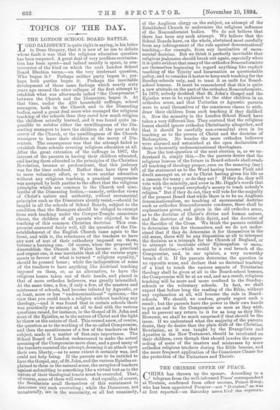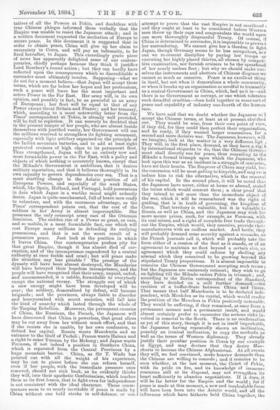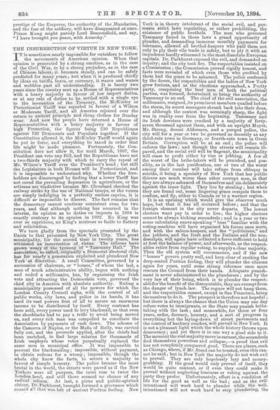THE CHINESE OFFER OF PEACE.
CHINA has thrown up the sponge. According to a telegram from the well-informed Times' correspondent at Tientsin, confirmed from other sources, Prince Kung,, who has been appointed Premier—not " Dletator," as was at first reported—on Saturday assen.b'ed the represen-. tatives of all the Powers at Pekin, and doubtless with true Chinese phlegm informed them verbally that the Empire was unable to resist the Japanese attack ; and in a written document requested the mediation of Europe to secure peace. In this document it is suggested that in order to obtain peace, China will give up her claim to suzerainty in Corea, and will pay an indemnity, to be fixed hereafter, to Japan. This exceedingly grave piece of news has apparently delighted some of our contem- poraries, chiefly perhaps because they think it justifies Lord Rosebery's recent action ; but they can hardly have reflected upon the consequences which so discreditable a surrender must ultimately involve. Supposing—what we do not for a moment believe—that Japan will accept these terms, which are far below her hopes and her pretensions, such a peace will leave her the most important and active Power in the Far East. Her army will, in its own opinion, and possibly in fact, be as powerful as an army of Europeans ; her fleet will be equal to that of any Power except Great Britain and France; and her treasury, which, according to a most noteworthy letter from the Times' correspondent at Tokio, is already well provided, will be full to repletion. It can scarcely be doubted that in the present temper of her people, who are almost beside themselves with justified vanity, her Government will use the millions received to strengthen its fighting armament, especially with light artillery organised on the principle of the Indian mountain batteries, and to add at least eight protected cruisers of high class to its permanent fleet. Thus strengthened, Japan will be an entirely new and most formidable power in the Far East, with a policy and objects of which nothing is accurately known, except that the Mikado's Government is ambitious, that it desires military reputation, and that it believes thoroughly in its own capacity to govern dependencies over sea. That is a most startling change in the Asiatic position of all European Powers and especially of the weak States, which, like Spain, Holland, and Portugal, hold possessions in Asia which Japan in a warlike mood might ardently desire. Japan is quite unexhausted, full of brave men ready to volunteer, and with the enormous advantage' as the Times' correspondent points out, that the cost of the soldiers in her Army is almost imperceptible. She possesses the only conscript army east of the Ottoman dominion. The sudden rise of a Power so great, so vain, and so mobile, is a most formidable fact, one which will cost Europe many millions in defending its outlying possessions, and that is not the worst result of a premature peace. Just look at the position in which it leaves China. Our contemporaries profess pity for that great Empire, though it has almost died of cor- ruption, and of the incompetence engendered by a central authority at once feeble and cruel; but will peace make the situation any less pitiable ? The prestige of the dynasty will have been almost destroyed, the Mandarins will have betrayed their hopeless incompetence, and the people will have recognised that their army, unpaid, unfed, and uncommanded, is a rabble, formidable to everybody except the national enemy. The struggle out of which a new energy might have been developed will be over ; the soldiery, demoralised by defeat, will become brigands ; and the provinces, always liable to disorder and honeycombed with secret societies, will fall into the kind of anarchy which lasted through the whole of the Tamping Rebellion. Moreover, the permanent enemies of China, the Russians, the French, the Japanese will have discovered that China is powerless, that great slices may be cut away from her without much effort, and that if she resists she is unable, by her own confession, to defend her capital. Russia wants Manchuria and an entrance to the Gulf of Pechili •' France wants Hainan and a right to enter Yunnan by the Mekong ; and Japan wants Formosa, if not indeed a position in Southern China, which is separated from the Central Provinces by a huge mountain barrier. China, as Sir T. Wade has pointed out with all the weight of his experience, may be cut to pieces before she can reform herself, even if her people, with the immediate pressure once removed, should not sink back, as he evidently thinks they will, into their apathetic Confucianism, which teaches them as its first lesson, that to fight even for independence is not consistent with the ideal character. These conse- quences seem to us nearly inevitable if peace is made by China without one bold stroke in self-defence, or one attempt to prove that the vast Empire is not moribund ; and they ought at least to be considered before Western men throw up their caps and congratulate the world upon one more thoroughly disgraceful Treaty. Of course, if China is determined to surrender, it is impossible to prevent her surrendering. We cannot give her a Gordon to fight Japan, though Germany seems to be less scrupulous, ncr can we re-cement discipline by paying her troops or executing her highly placed thieves, all chosen by competi- tive examination, nor furnish cruisers to be the spearhead of her nearly Useless fleet ; but why we should make our- selves the instruments and abettors of Chinese disgrace we cannot so much as conceive. Peace is an excellent thing in itself, but not when it demoralises a whole community, or when it breaks up an organisation so needful to humanity as a central Government in China, which, bad as it is—and there is no Government so corrupt, or one which tolerates such dreadful cruelties—does hold together in some sort of peace and capability of industry one-fourth of the human race.
We have said that we doubt whether the Japanese wi I accept the Chinese terms, at least as at present sket shed out. They would be wise, from their own point of view, if they did, for they could then perfect their organisation, and be ready, if they wanted larger concessions, for a second and more decisive war. The Japanese, however, will we imagine, look at the matter in a very different ligh They will, in the first place, demand, as they have a rig1 t by international etiquette to do, that the Chinese Govere- ment shall directly sue for peace, thus conceding to the Mikado a formal triumph upon which the Japanese, who look upon this war as an incident in a struggle of centuries, have set their hearts. The Emperor of China may yield, but, the concession will be most galling to his pride, anti may ev■ix induce him to risk the alternative, which is the removal. of his capital. In the second place' it will be noted that the Japanese have never, either at home or abroad, stated the terms which would content them ; a clear proof that they intend to ask more than the immediate object of the war, which it will be remembered was the right of guiding, that is in truth of governing, the kingdom of Corea. That territory is valuable, but it is valuable to Russia as well as China, and the Japanese may wish for more secure prizes, such, for example, as Formosa, with its coal-mines, and a right of complete free trade through- out the Empire, which would, they conceive, provide their manufacturers with an endless market. And lastly, they will probably demand some security against a revanche, as the French journals call it, which will probably take the form either of a cession of the fleet as it stands, or of an agreement to maintain no fleet beyond a certain size, an agreement which they could enforce by shelling army arsenal which they conceived to be growing beyond the stipulated Treaty proportions. It is almost impossible to conceive the Chinese Government accepting such terms ; but the Japanese are ominously reticent; they wish to go on fighting till the Mikado enters Pekin in triumph ; and, according to the Berlin correspondent of the Standard, they have decided on a still further demand,—the erection of a buffer-State between China and Corea. That means that half Manchuria is to be declared inde- pendent, with Moukden as its capital, which would render the position of the Manchus in Pekin positively untenable. They would be suffering, if they remained, at once from a permanent menace and a permanent insult, and would almost certainly prefer to encounter the serious risks in- volved in removal to the South. There is no confirmation as yet of this story, though it is not in itself improbable, the Japanese having repeatedly shown an inclination, possibly an ironical inclination, to copy the methods as well as the terms of Western diplomacy. They already justify their peculiar position in Corea, by our example in Egypt, and may declare that they desire Man- churia to become the Chinese Afghanistan. At all events they will, we feel convinced, make heavier demands than the Chinese are willing to concede ; and it remains to be seen whether, at the last moment, the Court of Pekin, with its pride on fire, and its knowledge of immense resources still at its disposal, may not strengthen ite heart sufficiently to abandon negotiations. If it does, it will be far better for the Empire and the world ; for if peace is made at this moment, a new and incalculable force will have been born into the Asiatic world, and all the influences which have hitherto held China together, the prestige of the Emperor, the authority of the Mandarins, and the fear of the soldiery, will have disappeared at once. Prince Kung might parody Lord Beaconsfield, and say, "I have brought you peace, with Anarchy."








































 Previous page
Previous page